Welcome to my writeblr! Use the handy-dandy tabs to navigate and shoot me an ask or something if you're still confused xD
Last active 4 hours ago
Don't wanna be here? Send us removal request.
Text
writing advice for characters with a missing eye: dear God does losing an eyes function fuck up your neck. Ever since mine crapped out I've been slowly and unconsciously shifting towards holding my head at an angle to put the good eye closer to the center. and human necks. are not meant to accommodate that sorta thing.
#Writing advice lesgooooo#perfect for a certain someone#not Power of Ages#writing advice#writing tips
78K notes
·
View notes
Text
Just started my 5th rewrite of a story in 6 years
feeling good
#well it's been 2 years and I'm like. 20k words in. progress IG?#not Power of Ages#save for the fact that...
1 note
·
View note
Text
this is so mean but sometimes i see published writing and suddenly no longer feel insecure about my own writing ability. like well okay that got published so im guessing i dont have much to worry about
111K notes
·
View notes
Text
Hey everyone! Just a heads-up that I am now taking WRITING COMMISSIONS! Deets below the cut :3
My rates are $10 for 1k words - the maximum I'm planning on taking on per commission is 10k, but hey! It's early days. I'm amenable to suggestions if people have any. I'm only accepting payment through PayPal at the moment.
I can write OCs or existing characters; I can write isolated scenes or short stories. I can write just dialogue, or I can write a piece without any dialogue at all. :P I'm also stylistically flexible! Do you want me to mimic the vocabulary and epistolary style of a classic novel? I can do that! >:3
I consider myself fairly open about what, exactly, I write (angst, fluff, important narrative beats, action, horror, snapshots into a moment, e.t.c. e.t.c.) but I reserve the right to turn down a request if I don't vibe with the concept/don't want to write it. I'll also just say upfront that I'm not accepting smut/kink-based commissions (I'm not AGAINST them, lmao, I'm just not interesed in writing 'em for money). I plan on communicating a lot throughout the process (including sending various snippets of WIPs, if that's what a person wants). My official turnarount time is two weeks for any one piece; I like to think I'd take less time than that, but it feels important to have a concrete deadline for myself, just in case. xD
Samples of my writing - and my various styles - can be found HERE! Though, if you're someone who followed my account because of my writing, on AO3 or elsewhere, I'm hoping you already know what I'm capable of. :D
And, uh, yeah! That's the important stuff off the top of my head. If I think of anything else, I'll add it here. If you're interested, please message me here on Tumblr! (Though you can also get in contact with me via my email - [email protected] - if that's more comfortable for you ^_^).
#might as well reblog this to my writeblr#(which I NEED to be more active on anyway#ESPECIALLY now that I've FINISHED A DAMN NOVEL)#ugh. anyway#not Power of Ages
10 notes
·
View notes
Text
I FINISHED MY FUCKING NOVEL

#first draft? DONE#second draft? DONE#edits and tweaks? DONE and DONE#writeblr#writeblr meme#and look I know these things are never definitively finished#and I'll probably end up seeking out people who'll have changes to suggest#but from my own 'behind-the-tapestry' perspective?? I'm 100% happy with it#GOD. what a fucking feeling#hope y'all get their with your things eventually#Finding Atlas
0 notes
Text
i dont consider myself a 'fashion guru' by any means but one thing i will say is guys you dont need to know the specific brand an item you like is - you need to know what the item is called. very rarely does a brand matter, but knowing that pair of pants is called 'cargo' vs 'boot cut' or the names of dress styles is going to help you find clothes you like WAAAYYYY faster than brand shopping
166K notes
·
View notes
Text
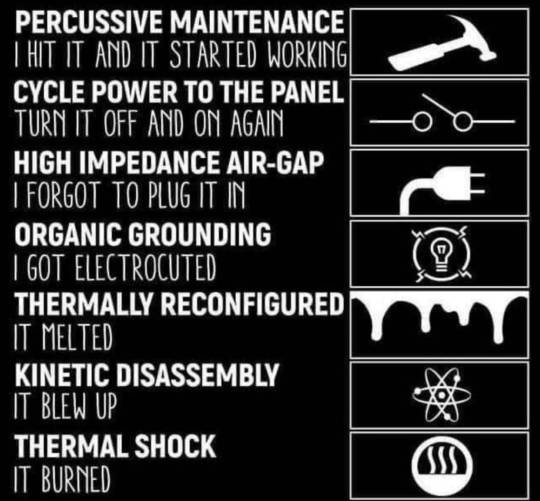
49K notes
·
View notes
Text

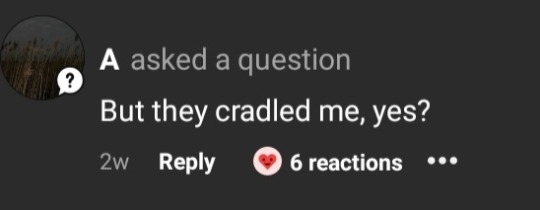
this hit me like a truck
118K notes
·
View notes
Text
67K notes
·
View notes
Text

#manifesting finishing and then not wanting to rewrite a story one of these days#not Power of Ages#WELL-#writing meme
20K notes
·
View notes
Text
Tips for writing those gala scenes, from someone who goes to them occasionally:
Generally you unbutton and re-button a suit coat when you sit down and stand up.
You’re supposed to hold wine or champagne glasses by the stem to avoid warming up the liquid inside. A character out of their depth might hold the glass around the sides instead.
When rich/important people forget your name and they’re drunk, they usually just tell you that they don’t remember or completely skip over any opportunity to use your name so they don’t look silly.
A good way to indicate you don’t want to shake someone’s hand at an event is to hold a drink in your right hand (and if you’re a woman, a purse in the other so you definitely can’t shift the glass to another hand and then shake)
Americans who still kiss cheeks as a welcome generally don’t press lips to cheeks, it’s more of a touch of cheek to cheek or even a hover (these days, mostly to avoid smudging a woman’s makeup)
The distinctions between dress codes (black tie, cocktail, etc) are very intricate but obvious to those who know how to look. If you wear a short skirt to a black tie event for example, people would clock that instantly even if the dress itself was very formal. Same thing goes for certain articles of men’s clothing.
Open bars / cash bars at events usually carry limited options. They’re meant to serve lots of people very quickly, so nobody is getting a cosmo or a Manhattan etc.
Members of the press generally aren’t allowed to freely circulate at nicer galas/events without a very good reason. When they do, they need to identify themselves before talking with someone.
91K notes
·
View notes
Note
Hey Natalie, I was wondering if you had any guides you used for self publishing? I've written like..... 2 and a half kissing books and I'm considering publishing them for fun and profit 😳 if not nbd, I am proficient in google, I just have trouble figuring out how much of that grind mentality is actually important.
I'm mostly blundering my way through this myself, but I'll give it a shot.
No matter what anybody tells you: Once you've written the book and cleaned it up for publication, the hard part's over. My sales as a self-pub author of extremely niche fiction are already way higher than I expected, and none of the work I've put into marketing has been half as much time or effort as actually creating the thang dings.
If you have the money, hire an editor. The Last Girl Scout was a self-edit (on account of I didn't and don't have the money), and while I am still very happy with it, it's nowhere near the book it could've been as a consequence--as many Goodreads reviewers will tell you.
I also recommend hiring a formatter. You can do your own formatting if you're like a nerd who knows about computers and stuff, but it's a lot of work and not everybody has that skill set. Also, like with editing, it is very very easy to overlook mistakes when it's your own work your dealing with. Here I'm gonna plug @kodyboye, who's formatted all the stuff I've sent to print and does excellent work (also fast as hell; iirc he had like 24-hour turnaround on the typescript of TLGS, which is a 600-page leviathan).
Once you've got your formatted files and cover art (which is a whole 'nother kettle of worms that I do not feel qualified to get into, I have An Associate who handles that for me), self-pub is as easy as hitting a button if you use Amazon KDP or as easy as hitting 3 or 4 more buttons if you use another service. Then you'll have a book and you'll be like "Wtf I'm an author."
(note on the above: Do not fuck w/ any service that asks you for money. Pay-to-play publishing services are 100% a scam; a publisher or publishing service asking an author to pay them is literally the same thing as your boss making you pay to come to work)
As for marketing: If you don't have the budget for paid promotions (which I don't and I'm assuming most ppl reading this don't), the best thing you can do is to Be A Person On The Internet. I'm lucky b/c I'd already developed a not-insignificant following from being a weird nerd Tumblr shitposter before I had to make a book happen, but you can speedrun that by just being generally active on your blog. In addition to whatever your regular blog content is, post samples of your work, talk about your creative process, be ready to talk about your books A Lot even on those days when it feels like nobody else is, and follow tags like #writeblr and #bookblr. (I'm also gonna tag in @thebibliosphere who is an A+ Tumblr follow and way better at this game than me)
I also very recommend joining a trade organization; I've been a member of the Horror Writers Association for a little over a year now and it's pretty great being automatically plugged into a network of other ppl in the industry.
And for broader-scope industry networking w/ people who are also very very invested in Writers Getting Paid For Their Work, I encourage (that is: beg) everybody who's even thinking about putting pen to paper to join the Freelance Journalists Union:
Hope this helps <3
#WOOO publishing advice!!#This is becoming more and more pertinent to me [eyes emoji]#not Power of Ages#writing advice#writing tips
3K notes
·
View notes
Text
Genuinely 90% of historical fiction would be so much better if more writers could get more comfortable with the fact that to create a good story set in a different time period you do actually have to give the characters beliefs & values which reflect that time period
#wriing stuff#writing advice#not Power of Ages#handy perspective to keep in mind if/when I ever do some historical fiction writing
83K notes
·
View notes
Text
Power Signalling
Kneeling. (It’s not popular for no reason.) Ordered to kneel as punishment or as a show of deference. Shoved physically to the ground by hands on their shoulders, maybe a kick to the back of the knee. Picking themself up off the ground but only getting as far as hands and knees. Crawling because they haven’t got the strength to stand any more. Dropping to their knees from exhaustion, or despair.
Personal space. Casually invading it. Uninvited touch - from the deeply creepy to something as simple as a firm hand on the shoulder. Standing too close - especially if taller or otherwise physically stronger. Conversely, hurrying to get out of someone’s way.
Eye contact. Staring someone down. Who is first to look away? Averting eyes for one’s social superiors. Insisting that someone maintain eye contact while you’re talking to them. Insisting that someone never look you in the eye. Trying to de-escalate by avoiding eye contact. Singling someone out just by looking at them. Too frightened or ashamed to look someone in the eye.
More generally, attention. The room falls quiet when they walk in. Who cuts in, and who gets talked over. Ignoring those who are beneath your attention. The excited attention given to the object of respect and idolisation. The careful, wary focus given to a potential threat. Deliberately attending to something else to appear less threatening. Deliberately burying oneself in something else to avoid attracting unwanted attention.
Codified status behaviours. Bowing to one’s superiors. Bonus points if there are differentiated kinds of bowing for different status differentials. Soldiers coming to attention when a superior officer comes in. Saluting. Who greets whom first? Serving food in a particular order. Standing up when a respected person enters the room.
Non-verbal threats. Just resting a hand on a weapon, or perhaps even just near a weapon. Cracking knuckles or rolling shoulders. Clenched fists. The little come-get-some-then lift of the chin. Stepping from a conversational stance into one that’s balanced for fight or flight. Pointing a weapon at someone. Casually brushing aside a weapon.
Conversely, de-escalation and surrender. Open hands, spread in front of them. Hands above head. (Raised slowly, transitioning from the simple woah-calm-down gesture to full on surrender as the situation gets tenser.) Going still. Slow, careful movements being sure to keep hands where they can be seen. Laying down weapons. Hands on head. Getting down on the floor. Deliberately making oneself vulnerable to prove non-hostile (or non-resisting) intent.
Alternately, deliberately showing “vulnerability” to demonstrate how little of a threat you consider the other person. The slouch of villainy. Casually putting weapons away or turning one’s back, confident that they won’t do anything. Open posture, casual, relaxed in the face of apparent danger.
Signs of fear. Flinching. Trembling. Closed, defensive posture. Tension. Backing away. Fidgeting. Lip-biting. Arms hugged close to chest. Or refusing to lower defences. Checking for escape routes. Trying to insist that they don’t come any closer.
Offers of or requests for help. Extending a hand to help someone up off the ground. Reaching out a hand in a silent plea. Do they have to ask for help? Are they willing to accept it? Do they get a choice? Who has plenty and who has to rely on the other’s goodwill? Picking someone up off the ground. Carrying them. (Dropping them?) Adjusting someone’s clothes. Withholding aid.
8K notes
·
View notes
Text
A general cane guide for writers and artists (from a cane user, writer, and artist!)
Disclaimer: Though I have been using a cane for 6 years, I am not a doctor, nor am I by any means an expert. This guide is true to my experience, but there are as many ways to use a cane as there are cane users!
This guide will not include: White canes for blindness, crutches, walkers, or wheelchairs as I have no personal experience with these.
This is meant to be a general guide to get you started and avoid some common mishaps/misconceptions, but you absolutely should continue to do your own research outside of this guide!
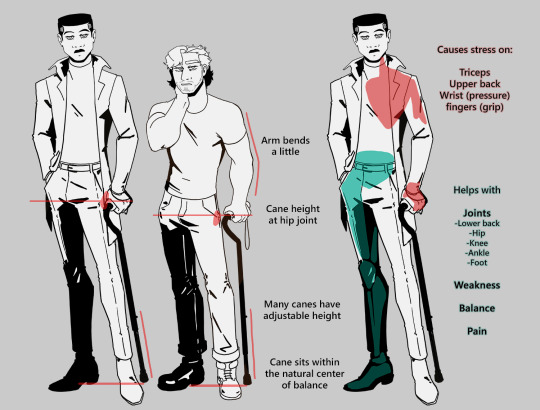
The biggest recurring problem I've seen is using the cane on the wrong side. The cane goes on the opposite side of the pain! If your character has even-sided pain or needs it for balance/weakness, then use the cane in the non-dominant hand to keep the dominant hand free. Some cane users also switch sides to give their arm a rest!
A cane takes about 20% of your weight off the opposite leg. It should fit within your natural gait and become something of an extension of your body. If you need more weight off than 20%, then crutches, a walker, or a wheelchair is needed.
Putting more pressure on the cane, using it on the wrong side, or having it at the wrong height will make it less effective, and can cause long term damage to your body from improper pressure and posture. (Hugh Laurie genuinely hurt his body from years of using a cane wrong on House!)
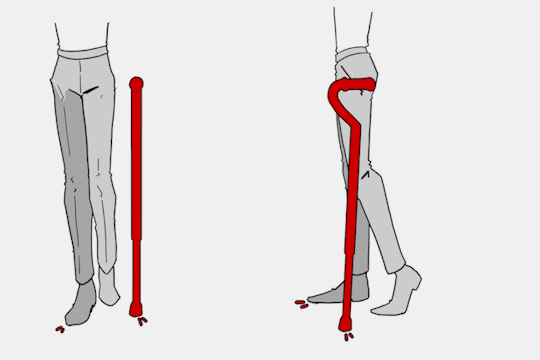
(an animated GIF of a cane matching the natural walking gait. It turns red when pressure is placed on it.)
When going up and down stairs, there is an ideal standard: You want to use the handrail and the cane at the same time, or prioritize the handrail if it's only on one side. When going up stairs you lead with your good leg and follow with the cane and hurt leg together. When going down stairs you lead with the cane, then the good leg, and THEN the leg that needs help.
Realistically though, many people don't move out of the way for cane users to access the railing, many stairs don't have railings, and many are wet, rusty, or generally not ideal to grip.
In these cases, if you have a friend nearby, holding on to them is a good idea. Or, take it one step at a time carefully if you're alone.
Now we come to a very common mistake I see... Using fashion canes for medical use!
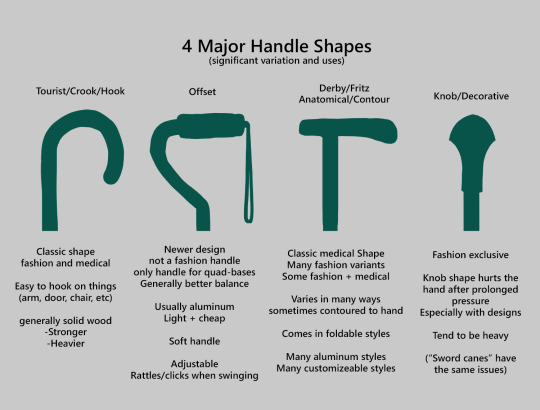
(These are 4 broad shapes, but there is INCREDIBLE variation in cane handles. Research heavily what will be best for your character's specific needs!)
The handle is the contact point for all the weight you're putting on your cane, and that pressure is being put onto your hand, wrist, and shoulder. So the shape is very important for long term use!
Knob handles (and very decorative handles) are not used for medical use for this reason. It adds extra stress to the body and can damage your hand to put constant pressure onto these painful shapes.
The weight of a cane is also incredibly important, as a heavier cane will cause wear on your body much faster. When you're using it all day, it gets heavy fast! If your character struggles with weakness, then they won't want a heavy cane if they can help it!
This is also part of why sword canes aren't usually very viable for medical use (along with them usually being knob handles) is that swords are extra weight!
However, a small knife or perhaps a retractable blade hidden within the base might be viable even for weak characters.
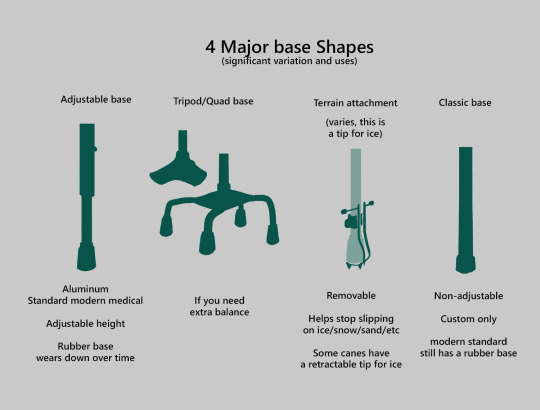
Bases have a lot of variability as well, and the modern standard is generally adjustable bases. Adjustable canes are very handy if your character regularly changes shoe height, for instance (gotta keep the height at your hip!)
Canes help on most terrain with their standard base and structure. But for some terrain, you might want a different base, or to forego the cane entirely! This article covers it pretty well.
Many cane users decorate their canes! Stickers are incredibly common, and painting canes is relatively common as well! You'll also see people replacing the standard wrist strap with a personalized one, or even adding a small charm to the ring the strap connects to. (nothing too large, or it gets annoying as the cane is swinging around everywhere)
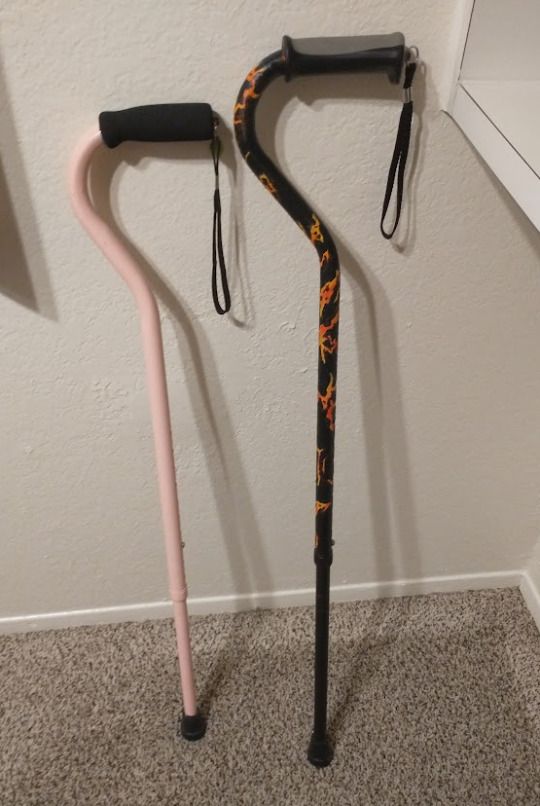
(my canes, for reference)
If your character uses a cane full time, then they might also have multiple canes that look different aesthetically to match their outfits!
When it comes to practical things outside of the cane, you reasonably only have one hand available while it's being used. Many people will hook their cane onto their arm or let it dangle on the strap (if they have one) while using their cane arm, but it's often significantly less convenient than 2 hands. But, if you need 2 hands, then it's either setting the cane down or letting it hang!
For this reason, optimizing one handed use is ideal! Keeping bags/items on the side of your free hand helps keep your items accessible.
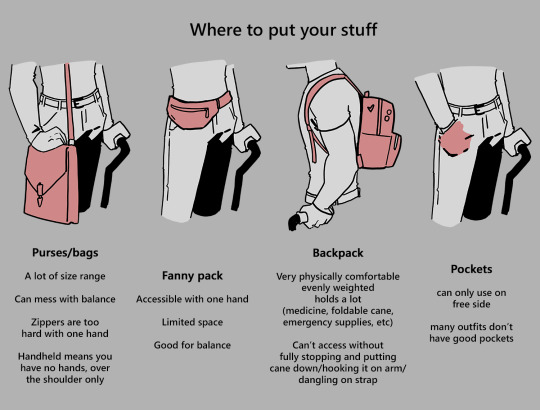
When sitting, the cane either leans against a wall or table, goes under the chair, or hooks onto the back of the chair. (It often falls when hanging off of a chair, in my experience)
When getting up, the user will either use their cane to help them balance/support as they stand, or get up and then grab their cane. This depends on what it's being used for (balance vs pain when walking, for instance!)
That's everything I can think of for now. Thank you for reading my long-but-absolutely-not-comprehensive list of things to keep in mind when writing or drawing a cane user!
Happy disability pride month! Go forth and make more characters use canes!!!
91K notes
·
View notes
Text
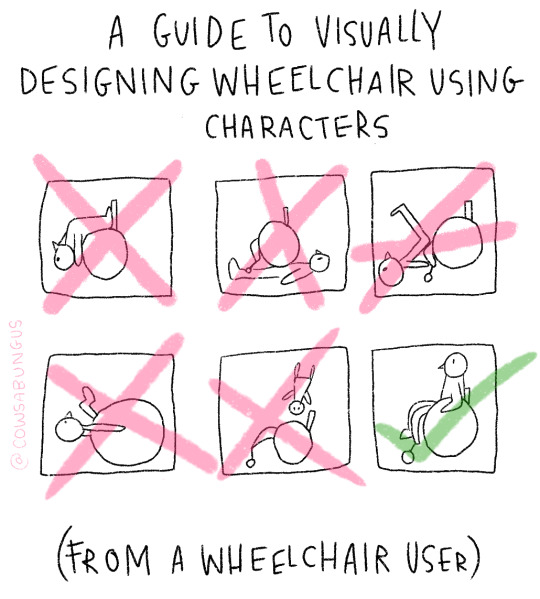
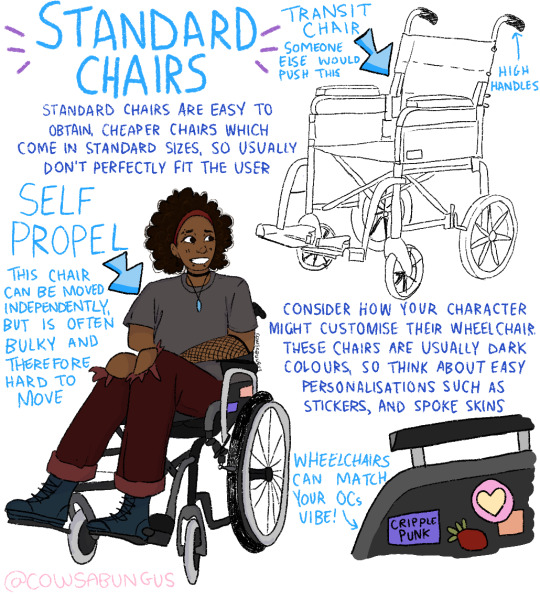
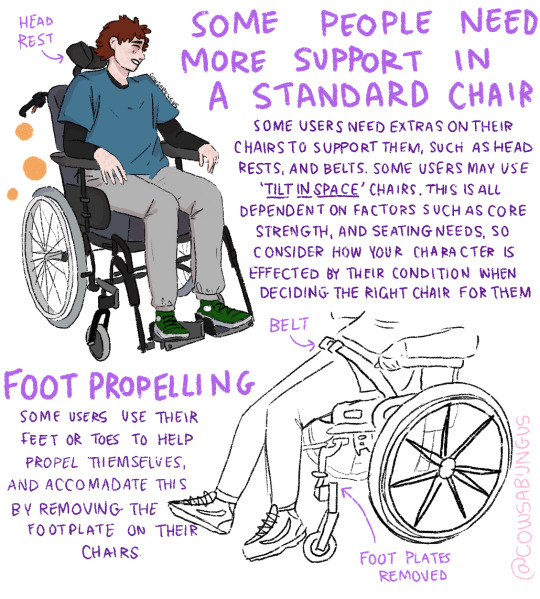

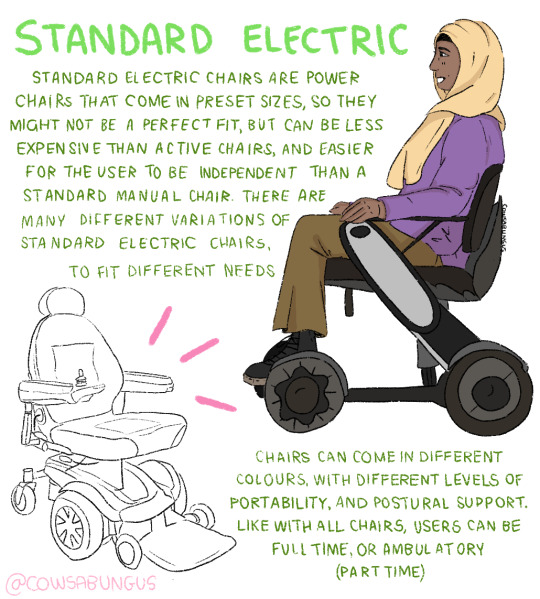

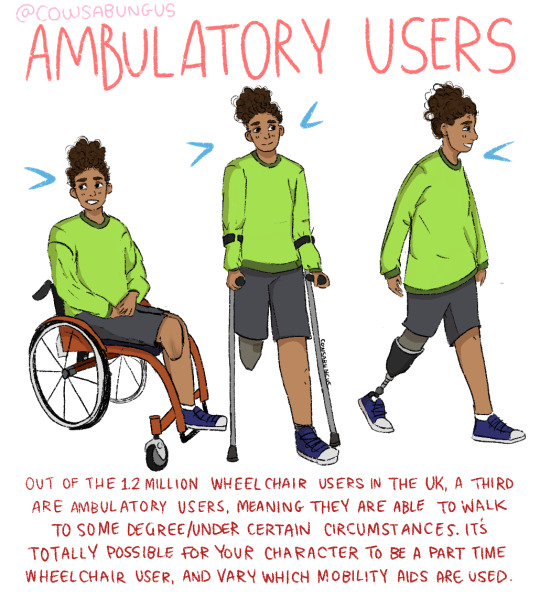
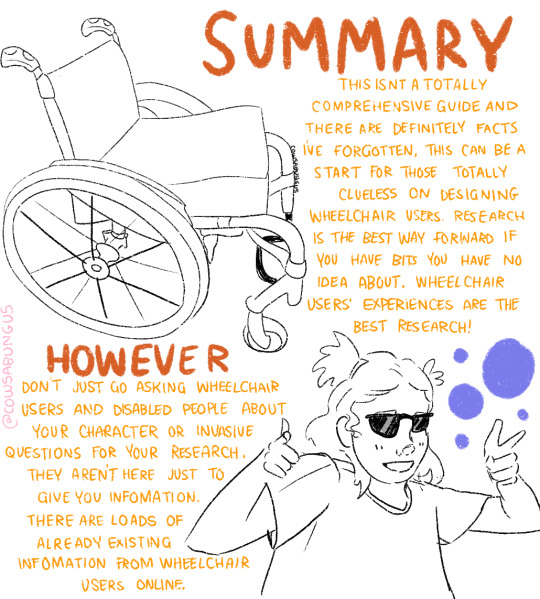
A guide to designing wheelchair using characters!
I hope this helps anyone who's trying to design their oc using a wheelchair, it's not a complete guide but I tried my best! deffo do more research if you're writing them as a character
113K notes
·
View notes
Text
Tips for writing black characters
Day-to-day practical and minor stuff, specially regarding hair
If you have curly/afro hair then you are only going to need to wash it one or twice a week
But it can take a while. When I had long hair it used to take me 2h in the bathroom to properly wash it. That's why I only did it once a week. But it really will depend of the thickness and lenght of their hair.
It can be a little harder to find products for their hair, because straight/wavy hair products don't work on ours
If you wash curly hair many times a week it will eventually lose its nutrients, differently from straigh hair
If your character originally had curly hair but straightened it, it's probably going to look a little drier than naturally straight hair. it's a case-case scenario, though
If they have a skin care routine or want one they'll also need products made specifically for black skin
Your character is not immune to sunburns. It's harder to see if it gets red depending on how dark their skin is, but it's there. The more melanin they have, the more protected from the sun they are, but it's not gonna 100% prevent them from getting sunburnt.
Oh, and it can be pretty hard to dye it because first, if your hair is very dark, you have to decolor it, and depending on how black it is it can take a while and a few tries to get in a tone good for dying.
If they have long hair they're probably going to take a while combing it because you have to apply the hair cream lock by lock
They may have a haircare routine every month or so. Not everybody does it but if your character is disciplined and wants their hair to be extra healthy and neat they'll probably have one
If they care a lot about their appearence they'll probably have a lot of hair brushes of different types because depending on your brush you can comb it in a variety of ways, making your hair look fuller, making the curls look defined, etc.
2K notes
·
View notes